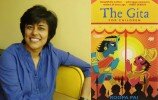
Komal Panwar
Blogger
On Janmashtami, Author Roopa Pai Gives Life Lessons To JWB From The Story Of Makhan Chor
- JWB Post
- August 25, 2016
Happy Janmashtami, all you lovely people! I’m in a very festive mood, and I also think I want to pretend to be Lord Krishna today so that everyone feeds me with a lot of makhan. You should try eating white butter with aalu ka panratha. Slurrrpp.
Meet one of Lord Krishna’s fans, Roopa Pai, the author of “The Gita for Children”. I’ve read the book; I think more than once. I was smitten by her when I saw her talk to school children at the Jaipur Literature Festival, and with the way she has answered all of my questions, I continue to get inspired.
Let us introduce you to Shri Krishna from an angle you’ve perhaps rarely seen.
Me: What was your first memory of “The Bhagwad Gita”?
Roopa: I grew up in a family that never read the Gita. We did not even have a regulation copy of the book at home. My first brush with the Gita was at school, which was strange because I attended a Christian missionary school. So while all of us students visited the chapel to pray before exams and enjoyed the beautiful Nativity scene the nuns set up there at Christmas-time, we also lived in fear of one of our math teachers, who insisted we wear bindis and bangles and recite the Gita in class! Because I was good at memorizing things, she picked me to take part in various Gita recitation competitions, which ensured that I spent half my lunch break mugging shlokas. It wasn’t the best introduction to the text.
Me: Do you think Lord Krishna was a feminist? What makes him a feminist/ not-a-feminist?
Roopa: I think that Krishna, like so many other Hindu Gods, epitomises gender equality. One of Shiva’s forms is Ardhanareeshwara – half man, half woman; one of Vishnu’s is Mohini the Enchantress, and in temples in Karnataka, we have a deity called Chennakeshava, or Keshava the Beautiful (not handsome), who is Vishnu, but with distinctly feminine facial features. Like them, Krishna also is very comfortable acknowledging and displaying his feminine side. Patriarchy is rampant in Indian society, as everywhere else in the world, but unlike in many other cultures, our gods acknowledge, through their own comfort with their different sexualities and gender identities. that everyone has a ‘male’ and ‘female’ side. And also that it is best to embrace both rather than allow one to suppress the other, and that, indeed, one needs the other to be a god-like, and therefore complete, being.
Me: How can Krishna’s advice to Arjun lead teenagers today to the right path?
Roopa: Krishna is both Arjuna’s mentor and his Best Friend Forever, and that’s why he chose to give him some great advice. But all of us, whether we are teenagers or adults, are Arjunas ourselves – we want to be good and responsible, we want to do the right thing, but we are either too scared to do the right thing, too lazy to do the right thing, or very often, not even sure what the ‘right thing’ is. The advice Krishna gives Arjuna is, therefore, advice for all of us, and we would all do well to take it. The lessons are easy enough in theory, but they are insanely difficult to put into practice. Lessons like:
(1) Be disciplined – about your work, your diet, your exercise, your sleep; (2) Do your duty not for rewards, but because it needs to be done; (3) Fulfill your responsibilities, even when there is no penalty for not fulfilling them; (4) Stay away from the twin monsters of kama (desire) and krodha (anger); (5) Treat everyone around you exactly the same, and with love and respect; (6) Don’t try to be someone else, stay true to yourself; (7) Acknowledge what the universe has given you and continues to give you each day, and show your gratitude by giving back in equal measure.
Me: What is the right attitude towards mistakes that we can learn from Krishna?
Roopa: According to Krishna in the Gita, no action by itself is good or bad, it is the intent behind the action that makes it so. You – or society – may consider a particular action a mistake, but if you performed the action without fear, without anger, without any malice towards anyone, and without any expectation of reward or profit, but simply because you felt it was your duty, and it had to be done, it isn’t really a wrong action at all, and you were right to do it. If not – i.e., if your action was driven by fear, anger, malice or greed – it was wrong action, and amends must be made. The most important thing, therefore, is to spend time reflecting on your actions before you do them, or, at the very least after you do them. Doing this reflection regularly will help you develop a powerful moral compass, a strong sense of what is right and wrong.
Me: How, in your opinion, can The Gita be regarded as a spiritual, and not a religious book?
Roopa: I like to call the Gita the world’s oldest self-help book. It tells you how to make friends (treat everyone the same), influence people (shoulder your responsibilities uncomplainingly), win every single time (do your duty without getting attached to its results – the peace of mind you gain thus is worth its weight in gold), pass exams (be disciplined about everything you do), and live a life full of happiness and joy (treat your every action as your gift to the Universe). Its philosophy; and its lessons are inclusive and secular – it neither requires the Gita adherent to be a card-carrying member of any particular religion, worship in any particular way, or believe in any particular god. In that sense, the Gita is much more than a ‘Hindu’ book; it’s a book from India that belongs to all humanity.
Me: We restrict children who are naughty. But, Krishna was one of them! What would your advice be to parents who have a Kanha in their house?
Roopa: I think children are the closest things to divinity that we as humans have real access to. As parents, the best thing we can do for them – and for ourselves – is to accept, even celebrate, their essential natures without trying to change them by force, and learn from them. We also need to respect them – something many of us find difficult to do; and love them unconditionally, which is again a very difficult thing (our love is often linked to them being obedient, doing what we want them to do). Of course, some disciplining may be required from time to time – hey, even Yashoda used to tie Krishna to the butter-churn!
Me: What is your favorite instance from the story of Lord Krishna?
Roopa: I think what I love best about the character of Krishna is how the human and the divine merge so wonderfully in him. The human side of him makes him a loving son, a loyal friend (to both Draupadi and Arjuna), a fierce defender of his people, a mischievous tease (but never a malicious one) with the gopikas, and a canny political strategist determined to ensure that the good guys win. But it is his absolute lack of selfishness – the fact that he never wants anything for himself and that all his actions are only driven by affection, compassion, and a sense of what is right – that makes him superhuman, divine. That is the Krishna quality we should all be aiming to emulate, over and above all his sterling human qualities.
Me: Who usually helps you in your dilemmas? Who is your Krishna?
Roopa: There isn’t one – there are so many. There are life lessons I learn from every person I interact with, either in real life or otherwise – my kids, my maids, my family, my friends, the municipal sweeper, a minor character in a not-so-famous book, Rafael Nadal, Dipa Karmakar, Shah Rukh Khan… When the dilemma comes, the answer also arrives, from one of these people.
Me: How has “The Gita” helped you become a better person?
Roopa: I think (I hope!) working on ‘The Gita For Children’ and going deep into some of the different layers of the text has made me a less judgmental person. I believe now that there are reasons why people are the way they are, and some of them are reasons that they cannot control – it’s just part of their nature, which is part of their karma, which is why it’s silly to judge them. The Gita has also taught me to be a more grateful person, and to understand that there is a great joy, and great peace, in doing something just for the sake of it, without always hankering after a particular result.
Me: We love your approach towards writing the book. In what language should parents speak to their children?
Roopa: In any language, as long as it is full of love, respect, and understanding, and works to build lasting bonds between them!
Me: How will you celebrate Janmashtami this year?
Roopa: Luckily for me, my two families support different deities, so the festive season is a real riot of food and fun. While my side of the family are Ganesha and Shiva fans and celebrate their festivals with much pomp and piety, my in-laws love Lord Krishna to bits and host a lovely birthday party for him each year, with the most brilliant traditional food. So I will be celebrating Janmashtami, this year as every year, with my in-laws at their home.
Think you’d want to follow The Gita’s teachings? You can buy Roopa Pai’s The Gita For Children, here.
- 0
- 0










